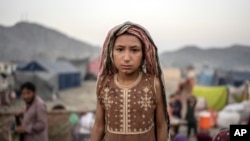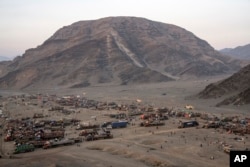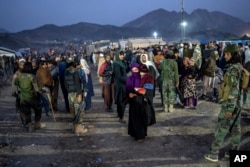Pakistan announced Friday that it had extended, after a delay of four months, the legal residence status of about 1.4 million Afghan refugees until year-end, though it again rejected calls to halt deportations of all undocumented Afghans and other foreign nationals.
The announcement comes as a relief to the refugee community amid a nationwide crackdown on foreigners illegally residing in Pakistan, including an officially estimated 1.7 million Afghans.
"[The] government of Pakistan is pleased to extend the validity of the Proof of Registration, or PoR, cards issued to the registered Afghan refugees … till [31st] December 2023," according to an official announcement seen by VOA.
U.N. glad for reprieve
A spokesperson of the United Nations High Commissioner for Refugees in Pakistan welcomed the decision, noting it was due in early July. He told VOA the delay had exposed refugee families to harassment and abuse, particularly after the crackdown was unleashed.
The registered refugees mainly comprise families that fled decades of conflict and persecution, starting with the Soviet invasion of Afghanistan in the late 1970s. Pakistan would lately renew their PoR cards every six months but did not do so when they expired on June 30 this year, nor did it explain the reasons for the delay in its Friday statement.
In early October, Islamabad abruptly gave all foreigners without legal documents one month to voluntarily return to their countries of origin, saying those who remained beyond the November 1 deadline would be arrested and deported for violating local immigration laws.
On Wednesday, Pakistani caretaker Prime Minister Anwaar-ul-Haq Kakar said more than 250,000 Afghan individuals had voluntarily returned home since his administration announced the plan to force out migrants without papers.
The Taliban government in Afghanistan has decried the deportation plan and demanded Islamabad reconsider it. The U.N. and global rights groups also have criticized the forcible eviction of Afghans, citing a humanitarian crisis in the impoverished country and fearing the move could expose returnees to retribution and abuses by Taliban authorities.
On Friday, Amnesty International again urged Pakistan to immediately halt its continued detentions and deportations of Afghans.
"No one should be subjected to mass forced deportations, and Pakistan would do well to remember its international legal obligations, including the principle of non-refoulement," said Livia Saccardi, Amnesty International's deputy regional director for campaigns for South Asia.
"If the Pakistani government doesn't halt the deportations immediately, it will be denying thousands of at-risk Afghans, especially women and girls, access to safety, education and livelihood," Saccardi said.
Sanctions include fine, prison
Pakistani Foreign Ministry spokesperson Mumtaz Zahra Baloch again dismissed the criticism Friday, reiterating the plan is not targeting Afghans only.
"This policy is reflective of Pakistan's desire to implement its own laws, which include sanctions for individuals who are here illegally, and these sanctions include fines, prison sentence, and deportation," Baloch told a weekly news conference in Islamabad.
Pakistani officials also have cited a spike in terrorist attacks they say are being plotted by Taliban-allied militants out of Afghan sanctuaries for unleashing the crackdown.
But they have repeatedly clarified that registered Afghan refugees and more than 800,000 others documented by the Pakistani government in collaboration with the International Organization of Migration are not the subjects of the deportation.
Returnees would face challenges
Afghans facing eviction include more than 600,000 individuals who fled the Taliban's takeover in Kabul two years ago. They either lack legal documents, or their visas have expired. These asylum-seekers are reluctant to go back, citing security concerns because of their association with the former American-backed Afghan government and the United States-led Western troops.
The U.S. has also moved to prevent the forced expulsion of about 25,000 Afghans who it says could be eligible for relocation or resettlement in the United States.
During a news conference on Wednesday, Kakar said individuals listed by the U.S. would not be forced out of the country.
The U.S. and allied troops, who stayed in Afghanistan for almost two decades, withdrew in August 2021 when the then-insurgent Taliban reclaimed power and imposed their interpretation of Islamic law to govern the impoverished South Asian nation, reeling from years of war and natural disasters.
Gallup, a U.S.-based research and polling organization, warned Friday that economic uncertainty awaits returnees in Afghanistan, where women's rights continue to deteriorate as they vanish from the workforce and majorities struggle to afford food and shelter.
"As thousands of Afghans are forced to cross the border from Pakistan, they face an economy unable to accommodate them, where job prospects are bleak, household incomes are squeezed, and millions are unable to afford the basic necessities of food and shelter," the organization said.






